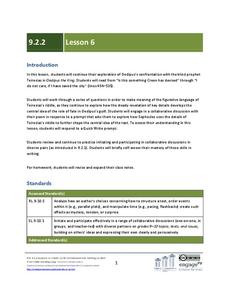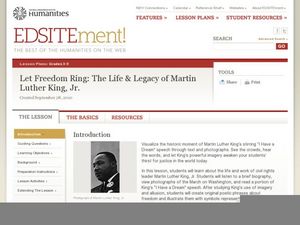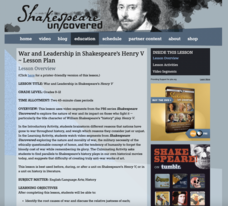Novelinks
Touching Spirit Bear: Question Answer Response Strategy
What types of questions help readers learn the most? Sixth, seventh, and eighth graders learn how to ask four types of questions from the Question Answer Response (QAR) reading strategy to help grow their comprehension of Touching Spirit...
Curated OER
Preparing for Poetry: A Reader's First Steps
Students complete poetry analysis using William Shakespeare's "Sonnet 130" as a part of a study of figurative language. In this Shakespearean language lesson plan, students define literal and figurative language and practice paraphrasing...
Curated OER
Jack London's The Call of the Wild: "Nature Faker"?
Middle schoolers take a stand on whether or not London could be dubbed a "nature faker." They support their position with evidence either historical or from the text. Students write an essay, complete with hypothesis and textual support,...
Curated OER
Inquiring About the Titanic
Students observe pictures of the Titanic sailing and at the bottom of the ocean. They hypothesize the cause of the Titanic tragedy and engage in deeper questioning while one student writes responses on the board. They then work in groups...
EngageNY
Grade 9 ELA Module 2, Unit 2, Lesson 6
The battle of wits and wisdom rages in Sophocles' Oedipus the King, particularly in Oedipus' discussion with Teiresias about the Sphinx's riddle. Ninth graders focus on this crucial conversation with a literary analysis instructional...
Curated OER
"I am Not Well": Unspoken Endings and Unscripted Scenes
Students analyze Act 4, scene 1 from the play, Merchant of Venice. They hypothesize the content of an unscripted moment and response, look for evidence in the text to support their hypothesis, rewrite the scene, and perform it for the...
Curated OER
Change slander to remorse: Unscripted Scenes
High schoolers hypothesize about the content of unscripted moments, search for evidence in the actual text to support their hypothesis, and explore how this hypothesis would affect characterization.
Curated OER
Organizing One’s Thoughts
Students take a closer look at the organization of written pieces. For this writing skills lesson, students examine transitions, repetition, parallelism, and other organizational patterns in writing.
Curated OER
Spinning Your Wheels
Students read various articles related to transportation and land use. They cite textual references as they engage in panel discussions, shared inquiry discussions and debates. They write a persuasive essay on the topic.
Personal Genetics Education Project
DNA, Crime and Law Enforcement
Civil rights meets biotechnology in a instructional activity that scrutinizes the collection of DNA of citizens who have been arrested, but not yet convicted of a crime. Real-life cases are examined in which the DNA of a relative was...
Harry S. Truman Library & Museum
Marshall Plan: Convince the American People
This is an excellent resource for US history classes, especially AP history. After learning some background on the Marshall Plan, the class, divided into two groups, researches opposing positions on this aid program. Groups read and...
Cornell University
Fibers, Dyes, and the Environment
Nanofibers can be made through electrospinning or force spinning in order to reduce the negative impact on the environment. Pupils study the role of fibers and dye on the environment through a series of five hands-on activities. Then,...
Curated OER
Anne Frank: One of Hundreds of Thousands
Middle schoolers conduct research to put Anne Frank's diary into historical context. They use maps, timelines, essays and websites to examine the early victories of the German army, paying special attention to the Netherlands and...
Curated OER
Let Freedom Ring: The Life & Legacy of Martin Luther King, Jr.
Students use text and photos to visualize the delivery of Dr. Martin Luther King, Jr.'s historic "I Have A Dream" speech. They analyze Dr. King's speech for examples of imagery and allusion and create original poetry and illustrations...
Curated OER
Designing a Real Life Ecosystem!
Students research abiotic and biotic factors concerning the concept of an ecosystem. Record and analyze data collected. Write a lab report in proper and scientific format with thinking and analytical skills. Work as a cooperative team.
Historical Thinking Matters
Spanish-American War: 3 Day Lesson
Why did the United States choose to invade Cuba in 1898? As part of a 3-day lesson plan, your young historians will first develop working hypotheses to answer this question, then work with a variety of historical primary source documents...
Student Achievement Partners
Laura Hillenbrand's "Unbroken" and Jeanne Wakatsuki Houston and James D. Houston's "Farewell to Manzanar"
Passages from Unbroken and Farewell to Manzanar provide the context for a study of the historical themes of experiencing war, resilience during war, and understanding the lasting trauma of war. Appendices include extension activities,...
Southern Nevada Regional Professional Development Program
Reading Literature - Romeo and Juliet
“What is the theme of this story?” Now there’s a question all pupils dread. Rather than encountering a sea of faces that look like they were painted by Edward Munch, face a classroom filled with smiles and confidence. Show your readers...
Curated OER
Persuasion as Text: Organizational, Grammatical, and Lexical Moves in Barbara Jordan’s "All Together Now"
A thorough instructional activity on persuasive writing takes middle schoolers through several activities, including group discussion, collaborative posters, and independent writing. They compare historical speeches and analyze the...
Curated OER
Advertising in the Contemporary World: An Introduction to Persuasive Texts
Beginning a persuasive writing unit with your middle schoolers? Approach it through something that persuades us all: advertising! Through studying video and print advertisement, your class will practice Common Core skills for reading...
Shakespeare Uncovered
War and Leadership in Shakespeare’s Henry V
“Compared to war all other forms of human endeavor shrink to insignificance.” “War is not healthy for children and other living things.” These two views of war, embodied in George Patton’s statement and Lorraine Schneider‘s famous 1966...
Curated OER
Access Ramp
Just about every public building that your students are familiar with has an access ramp which complies with ADA requirements. As it turns out, designing such a ramp is an excellent activity to incorporate slope, the Pythagorean Theorem,...
Curriculum Corner
ELA Common Core Checklists for K-6
In the hustle and bustle of life in the classroom, it's easy for teachers to lose track of the standards they have taught, and those that still need to be addressed. This Common Core checklist provides educators with an easy-to-use...
National Endowment for the Humanities
Galileo: Revealing the Universe
To gain an understanding of the significance of Galileo Galilei's revolutionary ideas, class members watch the short video "Stargazing Before Galileo," and conduct a close reading of Galileo's Sidereal Messsenger. They then compare...

























